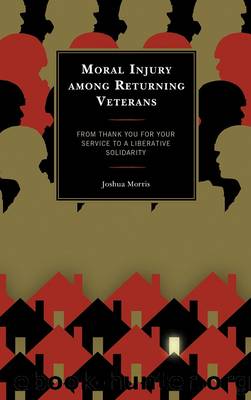Moral Injury Among Returning Veterans by Joshua Morris

Author:Joshua Morris
Language: eng
Format: epub
Publisher: Lexington Books
Published: 2021-01-15T00:00:00+00:00
Society: Divided Identities
The theme of âdivided identityâ connected most directly to the ideological critique I am advocating. I want to specifically handle the ideological implications of reintegration as I have not yet discussed the direct role ideology and society played in shaping each interviewed veteransâ reintegration. Phillipâs alienation from the army introduced a unique experience of being a reservist and attempting to reintegrate a MIE. After the deployment, the individuals that perhaps understood Phillip the best âwent their separate ways.â His mentor, Sergeant First Class Eric Clausen, a blond surfer from San Diego who joined the military at eighteen to travel the country, was direct, tough, but always dependable. He taught Phillip more efficient ways to clean his truck; he taught Phillip easier ways to get Wi-Fi access in remote Afghanistan; and, he taught Phillip how to be a deployed husband. Phillip wanted to be a SFC Clausen to the new soldier he met when he returned to drill. When the unit returned to the United States, Clausen transferred, but did not say good-bye. Transferring is not atypical for a restructuring unit: reservists went back to school, took new jobs, or simply just went away for a while to reconnect. Phillip was left, alone, to reintegrate into civilian life. This reintegration was difficult and is still ongoing.
Phillip is torn when he discusses society. On one hand, he is appreciative of most people who thank him. Remember, above, he stated, âSome people thank me, and I thank them for their appreciation.â He wants to believe that people are appreciative of his service and sacrifice, but with some groups of civilians, their actions tell him otherwise. Phillip can feel it when ideology is functioning. The handshakes are flimsy. The eye contact is nonexistent. Phillip believes that his generation is âthe last one to get a thank you.â Gratitude, for Phillip, is complex. Ungratefulness, on the other hand, is a simple act of dishonor. Phillip recounts one story he âcanât get overâ:
I had these two conversations with people that I canât get over. This one dude told me, âwe shouldnât even be there. You all are fighting a lost cause.â I was so pissed, what has that guy ever done?! I do work with a lot of vets, and they get it. One former Navy SEAL told me to keep my head down. His last words to me were, âdonât get killed.â He was the coolest dude. He was a Vietnam vet, and he was called a âbaby killerâ when he came home. He told me, âThese people donât realize that I killed somebody yesterday, and could kill you today and not even blink an eye.â These people are so lucky. He did the job. I was just a reservist. . . Guys like that helped me get through.
I met this woman; it was around Christmas time, as I was walking into the mall. I was wearing a unit T-shirt from Afghanistan. She said, âWhen did you serve?â I explained that I just got back, and am in the Reserves.
Download
This site does not store any files on its server. We only index and link to content provided by other sites. Please contact the content providers to delete copyright contents if any and email us, we'll remove relevant links or contents immediately.
| Ethics | Etiquette |
| Fashion & Image | Health & Stress |
| Motivation & Self-Improvement | Work Life Balance |
| Workplace Culture |
Tools of Titans by Timothy Ferriss(8216)
Change Your Questions, Change Your Life by Marilee Adams(7635)
Deep Work by Cal Newport(6879)
Man-made Catastrophes and Risk Information Concealment by Dmitry Chernov & Didier Sornette(5921)
Playing to Win_ How Strategy Really Works by A.G. Lafley & Roger L. Martin(5916)
Digital Minimalism by Cal Newport;(5663)
Big Magic: Creative Living Beyond Fear by Elizabeth Gilbert(5610)
The Slight Edge by Jeff Olson(5346)
Ego Is the Enemy by Ryan Holiday(5294)
The Motivation Myth by Jeff Haden(5156)
Stone's Rules by Roger Stone(5026)
The Laws of Human Nature by Robert Greene(4996)
Tuesdays with Morrie by Mitch Albom(4690)
Eat That Frog! by Brian Tracy(4433)
Rising Strong by Brene Brown(4377)
Skin in the Game by Nassim Nicholas Taleb(4161)
Bullshit Jobs by David Graeber(4094)
The Money Culture by Michael Lewis(4076)
Skin in the Game: Hidden Asymmetries in Daily Life by Nassim Nicholas Taleb(3929)
